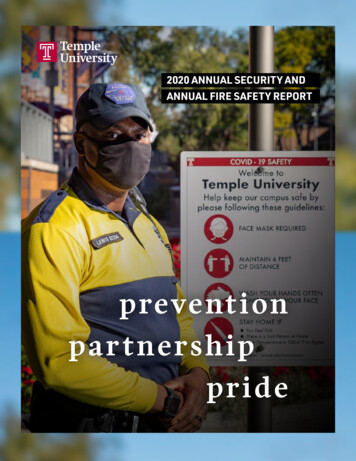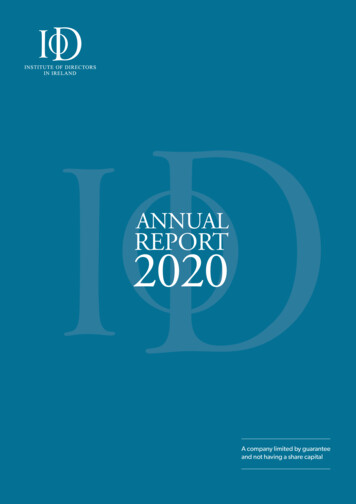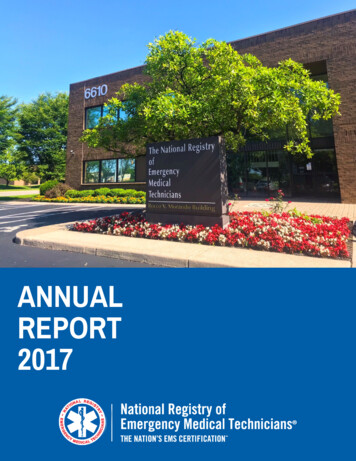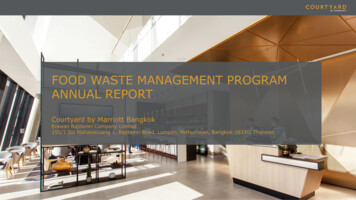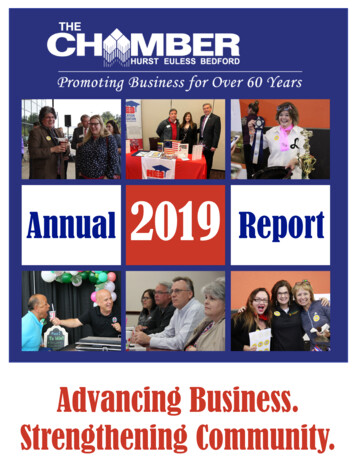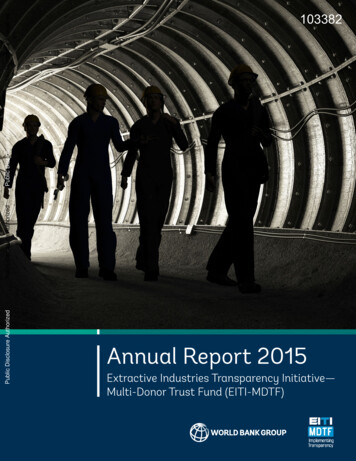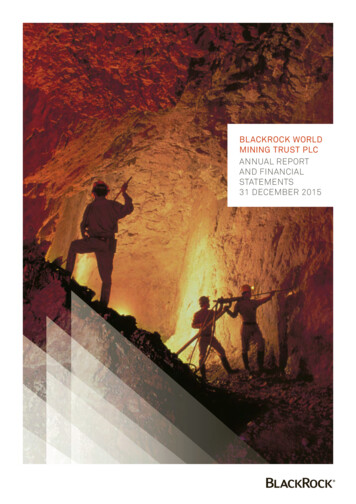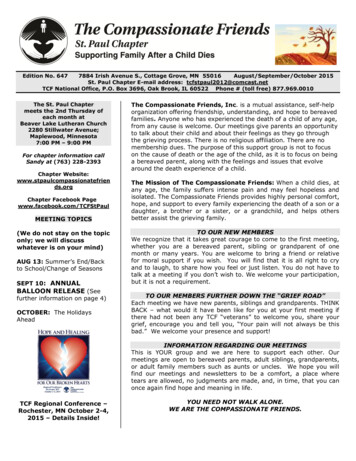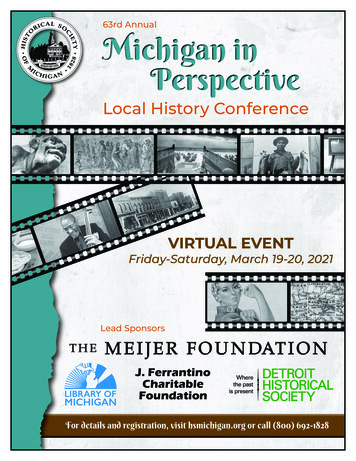
Transcription
63rd AnnualMichigan inPerspectiveLocal History ConferenceVIRTUAL EVENTFriday-Saturday, March 19-20, 2021Lead SponsorsJ. FerrantinoCharitableFoundationFor details and registration, visit hsmichigan.org or call (800) 692-1828
Sponsored byLead SponsorLake Superior SponsorsJ. FerrantinoCharitableFoundationLake Huron SponsorsLake Michigan SponsorsLake Erie SponsorsHistorical Society of the U.S. District Court for the Eastern District of Michigan
Bonus Conference MaterialOn-Demand VideosBefore, During, and After the Conference!Tours!oremnEve story s!hi ationntespreHear authorstalk abouttheir books!Workshops!Learn moreabout theconferencesponsors!2021 Michigan History Day Michigan History Day (MHD) is a yearlong educational program that encouragesstudents to explore local, state, national, and world history.After selecting historical topics that relate to the annual theme, students conductresearch; analyze and interpret their findings; draw conclusions about their topics’significance in history; and create final projects in one of five categories: paper, exhibit,documentary, website, or performance.Winners of the state-level MHD competition in the Junior and Senior categories moveon to compete in National History Day. For the health and safety of judges andstudents, both the state and national contests will be virtual this year.Volunteer to Be a Judge at Michigan History DayJudges are needed for the 2021 Michigan History Day State Finals, which will be avirtual contest this year. A judge can be anyone who enjoys sharing his or her interestin history with a younger generation. Judging will occur from April 5 to April 13, andvolunteers will need access to the Internet and a computer to judge. If you would liketo volunteer as a judge, please register online at hsmichigan.org/mhd/judges or call(517) 324-1828. Sign up today!
FridayMarch 199 to 10 a.m.Opening KeynoteCapitals and Capitols: Michigan’sOdyssey From Detroit to LansingValerie R. Marvin, Michigan State CapitolMichigan’s current capitol, the third building to hold that distinction, openedin Lansing on January 1, 1879. The road to that day, however, was long and winding.When Michigan declared itself a state in 1835, Detroit served as the seat of stategovernment. But the capital soon moved to Lansing Township—then home to onlyeight voters. Travel back in time with us to learn the stories behind Michigan’s capitals(the cities) and capitols (the buildings).Sponsored byis pleased to sponsor the Historical Society of Michigan’s62nd AnnualMichigan in PerspectiveLocal History Conference
10:15 to 11:15 a.m.FridayMarch 19Living With the Enemy:World War ll POWs in MichiganExiled to Motown:Detroit’s Japanese AmericansGregory Sumner, University of Detroit MercyMika Kennedy, University of MichiganDuring WWII, Michigan hosted approximatelyAfter World War II’s Japanese-American incarceration,6,000 German and Italian prisoners of war in campsDetroit served as one of the resettlement program’sthroughout both peninsulas. The POWs cut pulpwood,major destinations. Come hear how those Japaneseharvested and canned fruit, and filled other jobs.Americans were able to preserve their culture in variousEscape attempts were rare, and many prisoners enjoyed forms throughout the area. This session will also covertheir forced stay in America. Join us to explore thisthe history of Japanese Americans within the broaderlittle-known chapter of Michigan history.industrial and racial history of Detroit.No News Today:The Detroit Newspaper StrikeDrawing Back the Curtain:Black Theaters in DetroitDan Golodner, Walter P. Reuther Library—WayneState University & Shawn Ellis, TeamstersGary Anderson, Plowshares Theatre CompanyThis presentation looks back on the Detroit newspaperstrike, in which six labor unions and 2,500 workerswent on strike against The Detroit News and the DetroitFree Press from 1995 to 1997. Today, the collections ofthe Walter P. Reuther Library preserve the memoryof that important moment in labor history.Throughout the twentieth century and into thetwenty-first, black theaters in Detroit have broughtstories of the African-American experience to life.Join us as we explore both the rich history andpresent-day existence of those Detroit establishments,such as the Plowshares Theatre Company, Michigan’sonly professional African-American theater company.LibrariesWe inviteyou toexplore ourcollections.The Burton HistoricalCollection is pleased tosupport the HistoricalSociety of Michiganand the 2021 Michiganin Perspective: LocalHistory Conference.lib.msu.edulib.msu.edu/branches/ua/
FridayMarch 1911:30 a.m. to 12:30 p.m.Lunch KeynoteThe Heart of the Matter:A Conversation With Senator Carl LevinWith Historical Society of Michigan Trustee Richard WienerFor nearly four decades, Carl Levin served as a U.S. senator, and upon hisretirement in 2015, he became the longest-serving senator in Michigan’s history. SenatorLevin witnessed wins, losses, and compromises for Michigan throughout his career, buthe never stopped fighting for what he believed in. Join us as Senator Levin shares storiesof his time in the Senate with Richard Wiener, who serves on HSM’s Board of Trustees.Do not miss this conversation between friends!Sponsored byVisit Safely!Our museums are open with enhanced safetymeasures to fight the spread of COVID-19.Featuring new exhibitions and virtual optionsMuseum Tours / Group workshops / Virtual programs for students and adultsFind details at detroithistorical.org
FridayMarch 19The Not So Open Road: Detroit’s Green Book2:15 to 3:15 p.m.1 to 2 p.m.Jamon Jordan, Association for the Study ofAfrican American Life and HistoryFrom the Roots Up:Urban Farming in the Motor CityBilly Wall-Winkel, Detroit Historical SocietyAfter being turned away from hotels, restaurants,and gas stations during a journey, African-Americanpostman Victor Hugo Green, along with the help ofother mail carriers, created the “Green Book,” whichlisted U.S. businesses that welcomed African-Americantravelers. Come hear how Detroit’s Green Book openedthe road for African Americans in Michigan.Detroit. The name does not evoke images ofvegetables and flowers—but it should. Urbanfarming dates back to the 1890s, when the city’sthen-mayor urged residents to plant on unoccupiedlots, and today, the practice continues to bringpeople and garden-fresh food together. Tune into discover this fresh yet historic subject.We Can Do It!The Rosies of Willow RunShock Waves From Stonewall:LGBT Liberation in MichiganAlison Beatty, Yankee Air MuseumTim Retzloff, Michigan State UniversityAs men were called to military duty duringWorld War II, women began to populate defenseplants across the United States. Join us at thissession to receive a history of the Willow RunB-24 Bomber Plant in Ypsilanti and the women,collectively known as “Rosie the Riveter,”who worked there.In 1969, the Stonewall Uprising in New York Citycatapulted the issues of gay rights to America’scenter stage. In Michigan, the LGBT communityresponded with its own movement, which led tosome significant milestones and change. Learnmore about the struggles of the gay community inthe 1970s and beyond.The Detroit River Runs Through ItThe Anishinaabe Women of MackinacDave Dempsey, For Love of Water &John H. Hartig, University of WindsorEric Hemenway, Little Traverse Bay Bandsof Odawa IndiansDetroit was the epicenter of the Fur Trade Era, anunparalleled leader of shipbuilding for 100 years,the “Silicon Valley” of the industrial age, and theunquestioned leader of the Arsenal of Democracy.Learn how the Detroit River has influenced andbeen influenced by the city’s industries and how it ischanging for tomorrow.The history of the Straits of Mackinac cannot betold without including the lives of the femaleAnishinaabe leaders in the area. Join us to hearabout those strong women, such as Agatha Biddle,who helped preserve Native customs and traditionsduring a period of cultural amalgamation in theGreat Lakes region.Notes in the Air: Jazz From DetroitBack on Track:The Michigan Central StationMark Stryker, Arts Journalist and AuthorIn the 1940s and 1950s, a thriving Blackcommunity in Detroit supported a vibrantnightlife and exceptional public school musicprograms that transformed Detroit into ajazz authority. This golden age nurtured manylegendary musicians. Discover more about thecity’s pivotal role in shaping the course ofmodern and contemporary jazz.Rich Bardelli, Ford Motor CompanyIt is an iconic landmark and a vestige of aformer era. It has had its fair share of press—both good and bad. Explore the history, theturmoil, the abandonment, and the recentrevitalization of a one-of-a-kind Detroitstructure—the Michigan Central Station—in this breakout session.
FridayMarch 19Freedom and Resistance:The Underground Railroad in SE Michigan3:30 to 4:30 p.m.Rochelle E. Danquah, Michigan Freedom TrailCommission and Wayne State UniversityTuning In: Detroit TV Movie HostsTim Kiska, University of Michigan—Dearborn &Ed Golick, detroitkidshow.comRita Bell. Sir Graves Ghastly. Bill Kennedy. The Ghoul.Southeastern Michiganders were entertained byThis presentation explores the antislavery, abolition, andthese and other TV movie hosts, who introducedUnderground Railroad movements in western Wayne andvariousfilms and flicks and amused viewers duringOakland Counties and how area residents contributedcommercialbreaks. Tune in to reminisce and learnto those efforts with their assistance. Come to thismoreaboutthe larger-than-life hosts who wesession to learn about the freedom-seekers’ courage andwelcomed into our homes like old friends.determination as they traveled through Michigan.Building the Modern World:Albert Kahn in DetroitMichael H. Hodges, The Detroit NewsGerman-Jewish immigrant Albert Kahn was aninnovative architect who helped shape Detroit’sarchitectural and cultural history. He was alsothe savior of Detroit’s Diego Rivera murals andhad an important role during World War II dueto his designs. Join us to learn about Kahn’s legacyin both Detroit and Ann Arbor.Serving ourclients’ heritagemanagementneeds withhigh-qualityservices thatmeet and exceedprofessionalstandards andpracticesArchaeologyHistorical Services andPreservation PlanningHistorical Landscape ServicesCompliance & LitigationContact us today at info@chg-inc.comor call (833) 203-5017www.commonwealthheritagegroup.comThe North End of ParadiseKen Coleman, Michigan AdvanceThe North End in Detroit, so namedbecause it was the “north end” of ParadiseValley, was booming during the 1920sand 1930s, but like Paradise Valley andBlack Bottom, it was devastated bythe construction of I-75. Hear about theNorth End’s history and how it is making acomeback during this session.The Michigan inPerspective: LocalHistory Conferenceis sponsored in partby the MichiganCouncil for Arts &Cultural Affairs
FridayMarch 194:45 to 5:45 p.m.Evening KeynoteThe Roar of ’84:An Interview With Dave RozemaDave Rozema, former Tigers pitcher & William Anderson,Historical Society of Michigan and Michigan State UniversityExtension Advisory CouncilJoin us in conversation with former Detroit Tigers player Dave “Rosey” Rozema andTigers authority Dr. William Anderson. A Grand Rapids native, Rozema was draftedby the Tigers in 1975 as a pitcher and was a part of the Tigers’ World Series team in1984. Recently selected as one of the “10 Greatest Characters in Detroit Tigers History”by Sports Illustrated, Rozema will talk with Dr. Anderson and share stories about hisexperiences playing for the Detroit baseball team.Sponsored by
SaturdayMarch 209 to 10 a.m.Morning KeynoteCrusader for Justice:Judge Damon J. KeithPeter Hammer, Damon J. Keith Center for Civil Rights,Wayne State University Law SchoolThe Honorable Damon J. Keith, a Detroit native, was a staunch defender of both civiland constitutional rights. Keith’s dedication to racial and social justice formed throughhis early days in Detroit’s public schools, his time in the segregated U.S. Army, and hisyears in law school during the onset of the Civil Rights Era. Join us as we look back atJudge Keith’s life and commitments, his major cases, and those who influenced him.Sponsored byJ. FerrantinoCharitableFoundationA proud sponsor of theMichigan in Perspective:Local History Conference.J. Ferrantino Charitable Foundation
10:15 to 11:15 a.m.SaturdayMarch 20Guardians of Detroit:Architectural Sculpture in the Motor CitySharing the Wealth:The Legacy of C.S. MottJeff Morrison, Author and PhotographerMalcolm Cottle, Applewood: The CharlesStewart Mott EstateAs Detroit grew between 1850 and 1930, itswealthier citizens wanted to leave a mark on thecity. To do so, they constructed fine buildingsadorned with gargoyles and grotesques.Photographer and author Jeff Morrison willpresent an intimate and closeup look at someof Detroit’s finest architectural sculptures.While Charles Stewart Mott made his fortune as thecofounder of General Motors, his true legacy is whathe did with his wealth. The speaker will address Mott’srelationship with Flint, his instilled civic duty, andthe formation of his foundation in an effort to betterunderstand Mott’s mark on Southeast Michigan.John Conyers:A Political InstitutionYalla Eat!Arab-American Foodways in MichiganJoAnn Watson, Detroit City Council (Ret.)Matthew Jaber Stiffler, Arab AmericanNational MuseumThe longest-serving African-American congressionalofficial in history, Representative John Conyers was aninstitution. A tireless advocate for civil rights, Conyerswas the only elected official ever endorsed by theReverend Dr. Martin Luther King Jr. Join the speakeras she addresses Conyers’ achievements, his politics,and his enduring legacy.If you enjoy “sniffing out” and exploring fascinatinghistorical subjects, the Historical Society ofMichigan’s History Hounds lecture series offersweekly in-depth presentations, allowing attendeesto curl up with a myriad of historical topics. History Hounds is FREE for members of HSM.(Nonmembers can enjoy a lecture for 7.) Members of HSM member organizations canalso attend for free. Participants can join in remotely from thecomfort and safety of their homes.hsmichigan.org/programs (800) 692-1828Sponsored inpart byJoin us for a mouthwatering look at the history ofArab-American restaurants and food establishments inSoutheastern Michigan. Public foodways reveal not onlythe culinary customs and practices of a people but alsotheir history and traditions. “Yalla Eat!” means morethan “Let’s go eat!” It also means to discover a culture.
SaturdayMarch 2011:30 a.m. to 12:30 p.m.Lunch KeynoteBeyond the Bus: The Life ofActivist Rosa ParksJamon Jordan, Association for the Study ofAfrican American Life and HistoryWhat do you know about the woman behind the bus boycott? Rosa Parks livedthe life of a civil rights activist long before she stepped onto the bus in Montgomery—and she continued to motivate the movement for years following the incident.Join us as our speaker sheds some light on the life of the remarkable woman whofought tirelessly against housing discrimination, police brutality, and apartheid inMichigan and elsewhere.Sponsored byThe Museum of AfricanAmerican History is a proudsponsor of the Historical Societyof Michigan's Michigan inPerspective: Local HistoryConference.AARP Michigan is a proud sponsor ofthe Historical Society of Michigan’sMichigan in Perspective:Local History Conference
1 to 2 p.m.SaturdayMarch 20Keep ’Em Fighting:Chris-Craft’s Contribution to WWllFighting for Freedom:The 102nd U.S. Colored TroopsGeoffrey Reynolds, Joint Archives of Holland—Hope CollegeGeoff Blair, 102nd USCT Co. BOn December 7, 1941, the attack on Pearl Harbor ledthe United States into World War II. In Michigan, theChris-Craft Corporation quickly transitioned frombuilding pleasure boats to constructing military craftfor the war effort. Join the speaker to learn more aboutChris-Craft’s role in America’s “Arsenal of Democracy.”Of the 90,000 Michigan men who served with theUnion forces during the American Civil War, 1,600were African-American soldiers. This session tells ofthose courageous men who fought in decorated units,including the 1st Michigan Colored Troops InfantryRegiment, which became the 102nd United StatesColored Troops Regiment.Justice and Faith:The Frank Murphy StoryWhat Happened to the Cannons?Historic Fort WayneGreg Zipes, Lawyer and AuthorJames Conway, Historic Fort Wayne—City of DetroitFrank Murphy rose to fame as the judge of theOssian Sweet case. Later, he took on the mantles ofmayor of Detroit during the Depression, governorof Michigan during General Motor’s Flint sit-downstrike, and several federal positions under theleadership of Franklin Roosevelt. Tune in to discovermore about this remarkable Michigan man.Grand River Avenue: Michigan’s “Route 66”2:15 to 3:15 p.m.Jon Milan, Author & Gail Offen, LawrenceTechnological UniversityStretching from Detroit to Muskegon,Grand River Avenue can be thought of as the“Route 66” of Michigan. Tune in as wemap the fun and fascinating history ofthe road—from footpath to stagecoachroute, plank road to two-lane highway—through rare photos and lively anecdotes.John E. Fetzer and theQuest for the New AgeBrian C. Wilson, Western Michigan UniversityMichigan entrepreneur John E. Fetzer was aradio and TV pioneer, owner of the World SeriesDetroit Tigers, and one of the 400 wealthiestindividuals in America. Very few people knew Fetzerattributed his personal and professional success tohis spiritual practice. Join us as the speaker delvesinto Fetzer’s inspirational journey.In the 1840s, a new fort was built in Detroit.It was the city’s third—but the first constructedby American hands. Fort Wayne never fired a shotat an enemy. Instead, it became an inductioncenter from the Civil War to Vietnam. Join usas we look inside Detroit’s Fort Wayne.Washtenaw County’s African-Canadian andAfrican-American FamiliesOmer Jean Winborn and Cheryl Garnett,Fred Hart Williams Genealogical SocietySince before the American Civil War, African-Canadianand African-American families have migrated to andsettled in Washtenaw County. Descendants share howthose families built thriving, self-sufficient communitiesduring the Underground Railroad and Reconstructionperiods, the Civil Rights Movement, schooldesegregation, and past and present political upheavals.A Behind-the-Scenes Look at CreatingBeyond Pontiac’s ShadowCatherine Cocks, Michigan State University Press &Keith R. Widder, Mackinac State Historic Parks (Ret.)The book Beyond Pontiac’s Shadow: Michilimackinacand the Anglo-Indian War of 1763 explores the peopleand events of the attack at Michilimackinac onJune 2, 1763. The speakers will discuss, in interviewform, the research that went into the book and thepublishing partnership between Mackinac State HistoricParks and Michigan State University Press.
SaturdayMarch 20Conquering Heroines: U-M Women FightingSex Bias and Paving the Way to Title lXBeyond the Stereotype:Native People Then and NowSara Fitzgerald, Author3:30 to 4:30 p.m.Eric Hemenway, Little Traverse Bay Bandsof Odawa IndiansFifty years ago, sex discrimination was rampant on theUniversity of Michigan (U-M) campus. Women madeup only 7 percent of the faculty, and undergraduateadmissions officers enforced gender quotas. Learnabout the small group of women who successfullychallenged U-M and led the way for resolving similarcomplaints at other U.S. universities.Stereotypes of Natives are rampant in American societyand have been perpetuated by movies, media, consumerproducts, and sports. Those stereotypes have helpedcreate false images of Native people. Join us for thiscomparison of what has been portrayed and what iscurrently going on in “Indian Country.”Of Icebergs and Inquiries:Michiganders on the TitanicMichigan History Day Presents Michigan History Day National FinalistsMichigan History Day is a yearlongeducational program that encourages studentsto explore local, state, national, and worldh
State University & Shawn Ellis, Teamsters This presentation looks back on the Detroit newspaper strike, in which six labor unions and 2,500 workers went on strike against The Detroit News and the Detroit Free Press from 1995 to 1997. Today, the collect
